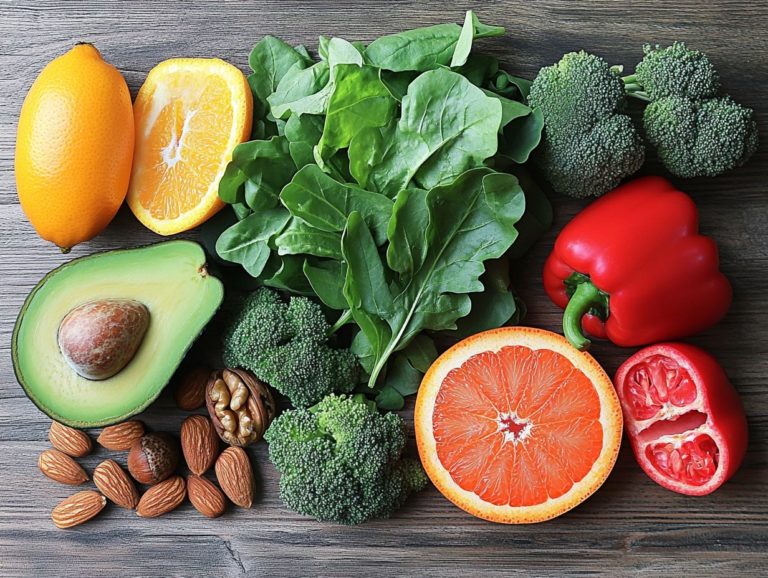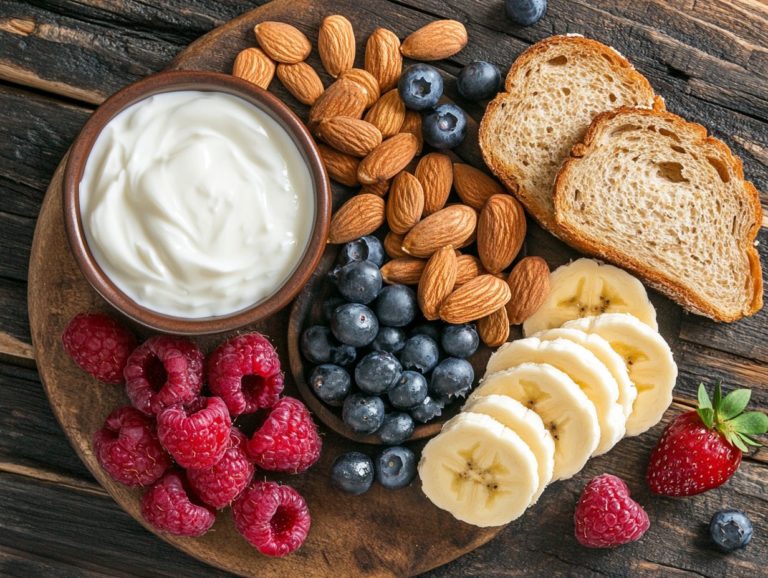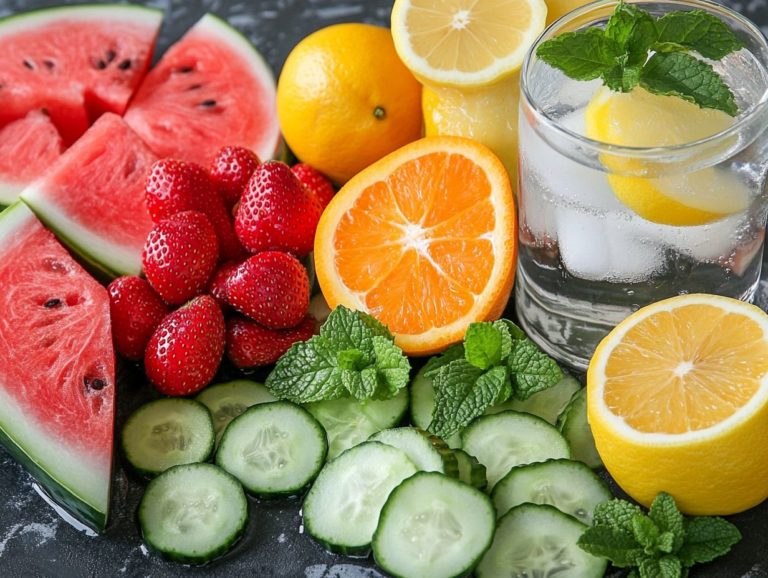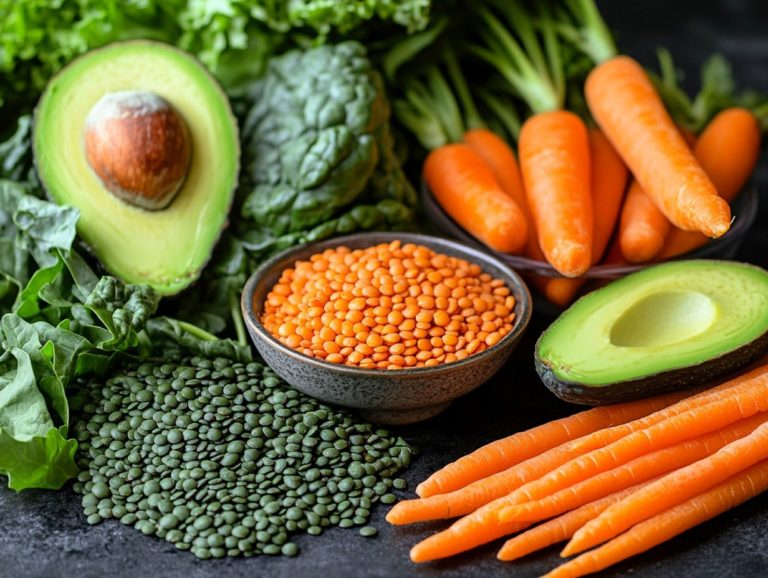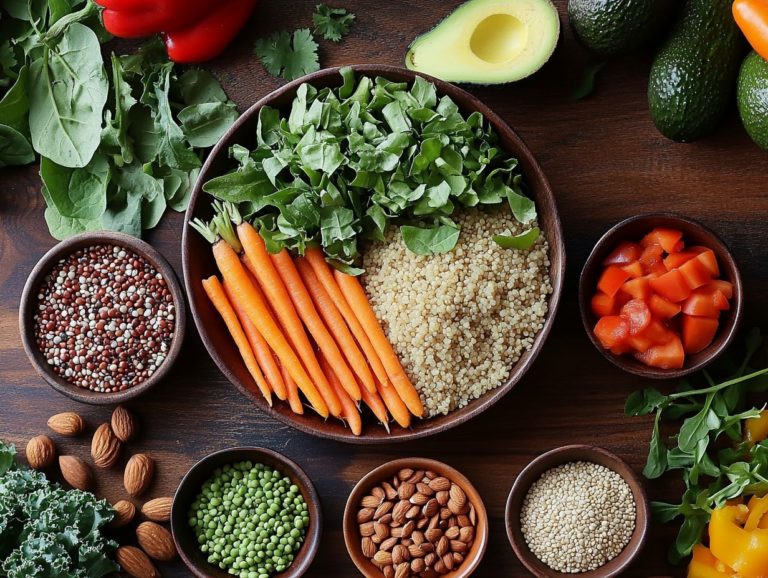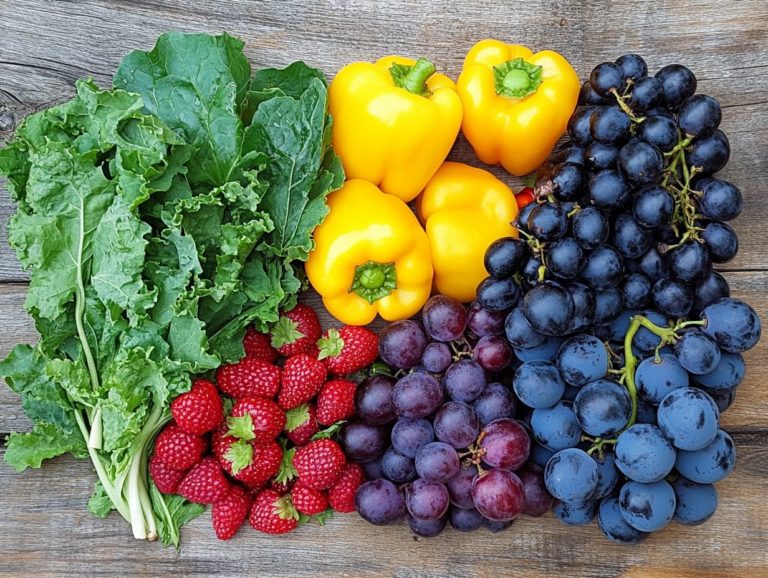Understanding Food Sources of Vitamin E
Vitamin E stands as a potent antioxidant, essential for upholding your overall health. It strengthens immune function and enhances skin vitality while safeguarding your cells from damage.
This article delves into the significance of Vitamin E, highlighting its key benefits and identifying the finest food sources to enrich your diet.
You ll also discover how to seamlessly incorporate it into your meals while being mindful of any potential risks, ensuring you are thoroughly informed about this vital vitamin.
Contents
- Key Takeaways:
- What is Vitamin E?
- Benefits of Vitamin E
- Food Sources of Vitamin E
- Incorporating Vitamin E into Your Diet
- Potential Risks and Considerations
- Side Effects and Interactions
- Choosing the Right Sources of Vitamin E
- Frequently Asked Questions
- What is vitamin E and why is it important?
- What are some common sources of vitamin E?
- How much vitamin E should I consume in a day?
- Can I take vitamin E supplements instead of getting it from food sources?
- Are there any health risks associated with consuming too much vitamin E?
- What are the signs of a vitamin E deficiency?
Key Takeaways:
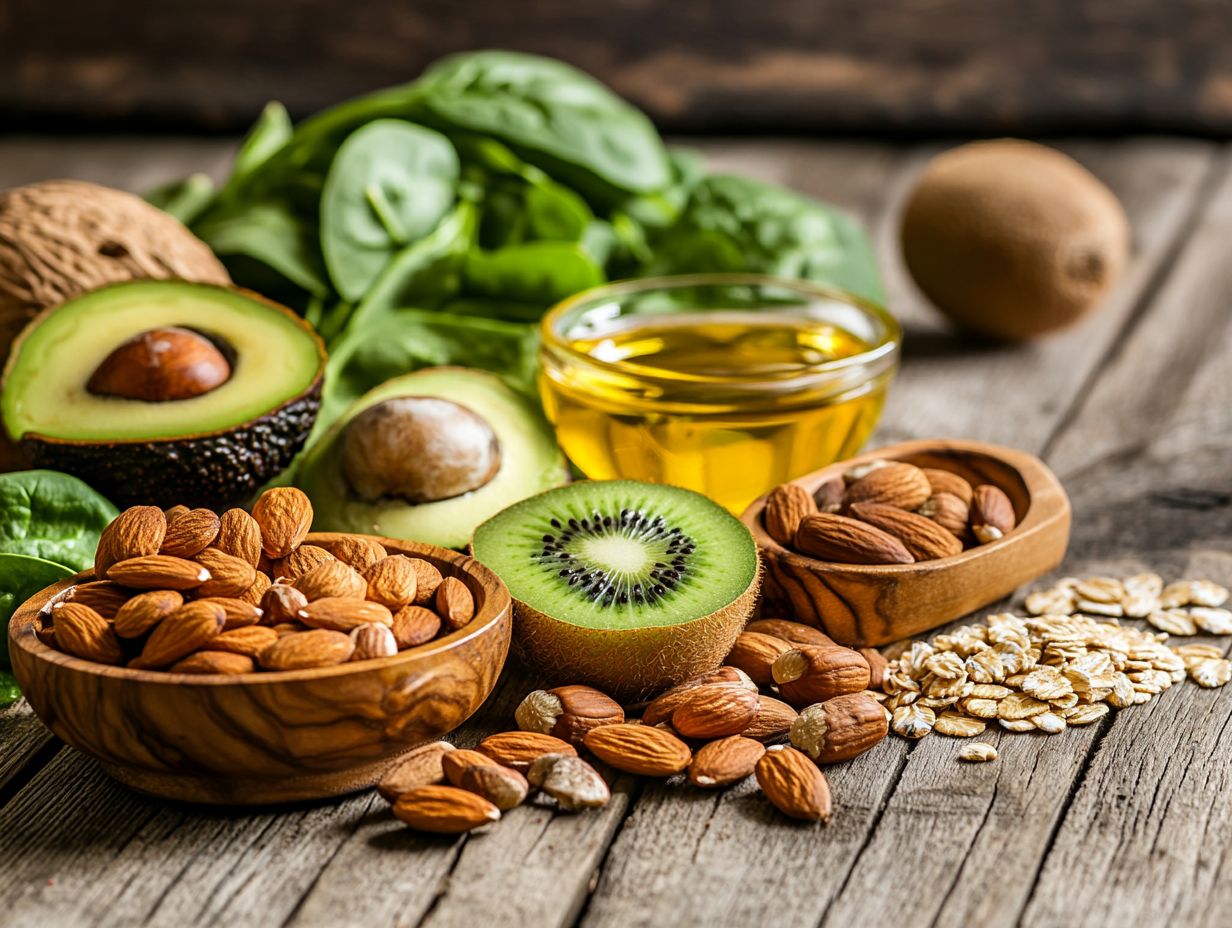
Vitamin E is vital for strong health and immunity. It is a fat-soluble vitamin that plays a crucial role in maintaining the health of our cells and immune system. Some key health benefits of Vitamin E include its antioxidant properties, ability to improve skin health, and potential to reduce the risk of heart disease. Incorporating Vitamin E into your diet can be achieved through natural sources such as nuts and leafy greens, as well as fortified foods and supplements if necessary. It is important to choose the right sources and stick to the recommended daily intake to avoid potential risks and side effects.
What is Vitamin E?
Vitamin E is a key vitamin that keeps our body healthy. It protects us from oxidative damage caused by harmful molecules called free radicals. This essential vitamin serves as a potent antioxidant, shielding your body from oxidative stress. Studies have shown that sufficient intake of vitamin E can strengthen immune function, enhance cognitive health, and potentially lower the risk of chronic diseases, including heart disease and certain types of cancer.
Since your body can’t produce vitamin E on its own, it’s crucial to obtain this vitamin through your diet and supplements.
Overview and Function in the Body
Vitamin E serves as a crucial antioxidant that protects your body from oxidative damage inflicted by free radicals. It primarily works by neutralizing these harmful molecules, preventing cellular degeneration and various chronic diseases.
Thanks to its fat-soluble nature, Vitamin E is efficiently absorbed in your intestines, especially when consumed with dietary fats. Once it enters your system, it distributes itself across various tissues, maintaining the integrity and functionality of your cell membranes.
Recent studies highlight its importance in combating oxidative stress, suggesting that maintaining adequate levels of Vitamin E can enhance your body’s defenses against inflammation and the effects of aging. Insights into its metabolism further reveal how Vitamin E collaborates with other nutrients, amplifying its protective benefits.
Benefits of Vitamin E
The health benefits of Vitamin E reach well beyond basic nutrition. This remarkable antioxidant is associated with a plethora of positive health outcomes, such as a reduced risk of cancer and an enhanced immune response.
Noteworthy studies, including the Nurses Health Study and the Women s Health Study, have demonstrated Vitamin E s protective effects on heart health, showcasing its potential in lowering the risk of heart disease and contributing to overall cardiovascular wellness.
Key Health Benefits
Vitamin E provides essential health benefits that can significantly contribute to reducing the risk of chronic diseases, including heart disease and prostate cancer, while also enhancing cognitive function.
This vital vitamin acts as a potent antioxidant, safeguarding your cells from oxidative stress a key player in the development of various chronic illnesses. Research published in the Journal of Urology indicates that adequate Vitamin E intake may lower the risk of prostate cancer, especially in men facing dietary deficiencies.
A study in the Archives of Internal Medicine revealed that older adults who consumed sufficient amounts of Vitamin E demonstrated better cognitive function, potentially delaying the cognitive decline often associated with aging.
These findings highlight the necessity of incorporating Vitamin E-rich foods, such as nuts, seeds, and leafy greens, into your diet to fully enjoy these protective benefits.
Start adding Vitamin E-rich foods to your meals today and unlock a healthier you!
Food Sources of Vitamin E
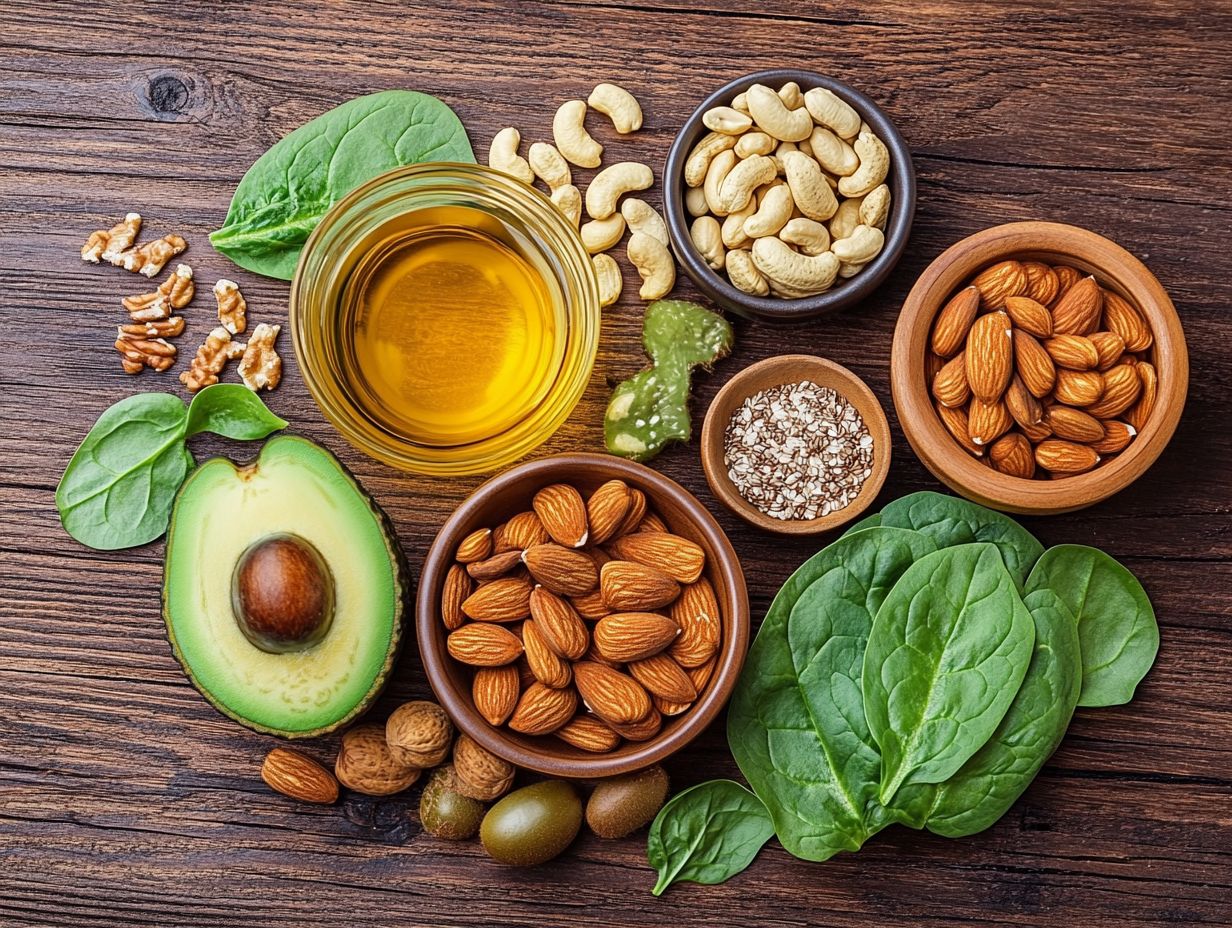
Incorporating a diverse array of food sources rich in Vitamin E into your diet is crucial for sustaining optimal levels of this vital nutrient.
Try sunflower seeds, almonds, avocados, and red bell peppers for a tasty boost!
These exceptional sources deliver Vitamin E and provide essential healthy fats and antioxidants that significantly contribute to your overall well-being.
Natural Sources of Vitamin E
Natural sources of Vitamin E encompass a variety of foods that not only provide this essential nutrient but also elevate your overall dietary quality.
Nuts like almonds and hazelnuts, along with seeds such as sunflower and pumpkin, stand out as particularly rich in Vitamin E.
Incorporating green leafy vegetables like spinach and kale into your meals enhances your Vitamin E intake.
Be aware of the recommended dietary allowance to ensure you meet optimal levels of this vital vitamin for good health.
Eating these foods in the right amounts supports cellular health and may lower the risk of chronic diseases, underscoring the importance of a well-rounded diet.
Supplements and Fortified Foods
Vitamin E supplementation can offer significant advantages for those who might not get enough from their diet. There are various options, from dietary supplements to fortified foods.
These supplements and foods are vital for promoting overall health, especially for individuals with specific dietary restrictions or health conditions that impede nutrient absorption.
You ll find different forms of vitamin E available in the market, including two types of vitamin E that each bring unique benefits to your body.
While high-dose vitamin E supplements can provide certain advantages, they can also come with risks, such as an increased likelihood of bleeding or gastrointestinal issues.
Recognizing your individual health needs and consulting a healthcare professional before introducing high doses into your routine is crucial for ensuring safety and maximizing benefits.
Incorporating Vitamin E into Your Diet
Incorporating Vitamin E into your diet is crucial for meeting your nutritional needs. The recommended daily intake varies based on factors such as age and gender, so tailor your consumption accordingly.
Recommended Daily Intake and Meal Ideas
The recommended daily intake for Vitamin E is generally set at 15 mg for adults, ensuring you have enough to support your overall health.
Incorporate rich sources of Vitamin E, such as nuts, seeds, and green leafy vegetables into your meals and snacks.
For instance, a delightful spinach salad topped with a sprinkle of sunflower seeds or a handful of almonds makes for a vitamin-rich option.
You might also whip up a quick smoothie with kale, avocado, and a tablespoon of almond butter. It’s not just a delicious treat; it s an effortless way to boost your Vitamin E intake while enjoying something nutrient-packed.
Potential Risks and Considerations
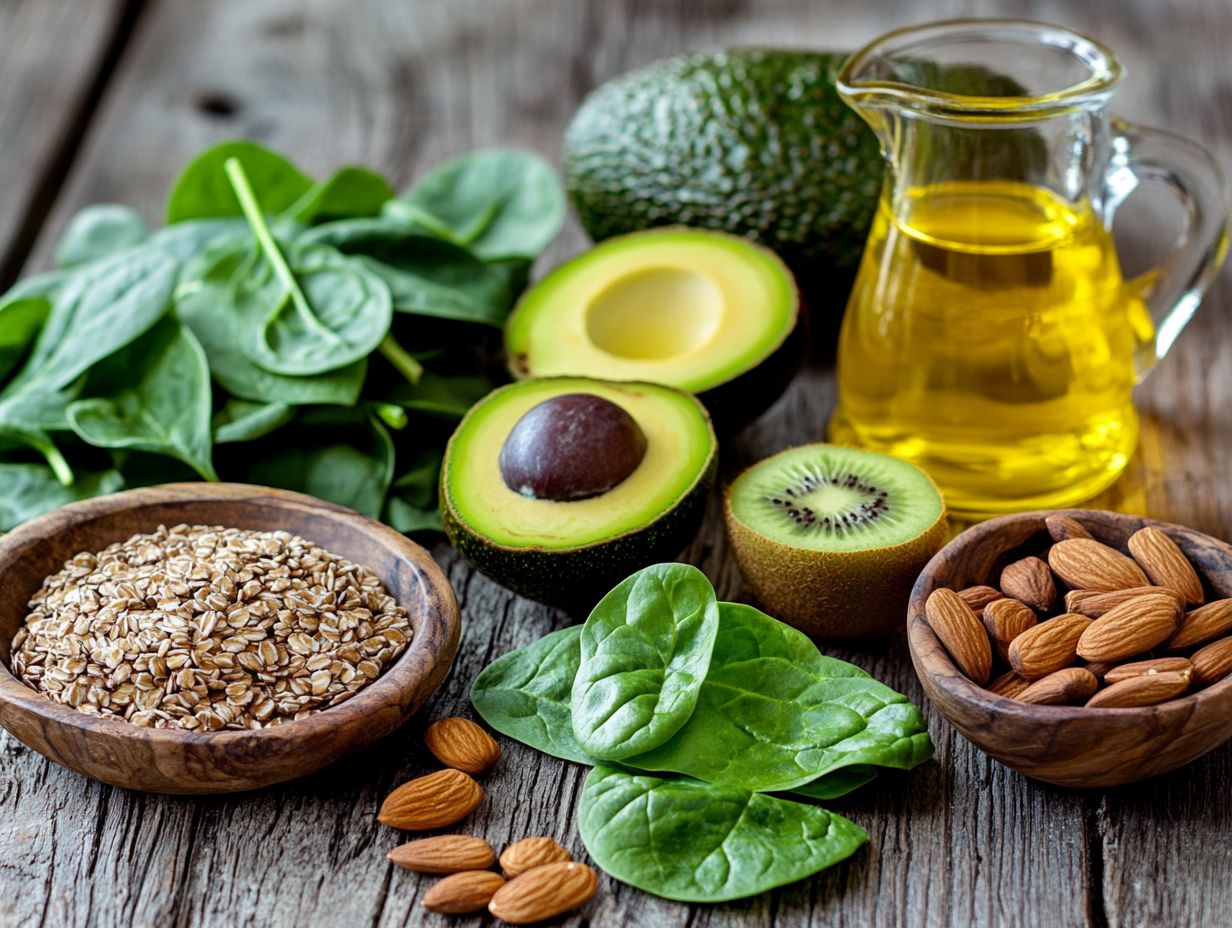
While Vitamin E is essential for your health, it’s important to recognize the potential risks and considerations that come with it, particularly concerning vitamin E toxicity and its interactions with medications.
Side Effects and Interactions
Vitamin E toxicity can occur with high doses, leading to potential side effects and interactions with other medications.
If you re relying on anticoagulant therapies, the stakes are even higher. Vitamin E can enhance the effects of blood thinners, increasing the risk of serious bleeding complications.
High doses may also cause symptoms such as fatigue, nausea, and diarrhea, or even more severe issues like an increased risk of hemorrhagic stroke.
Approach vitamin E supplementation cautiously. Keep your intake within recommended limits.
Consulting a healthcare professional before starting any supplementation is vital, especially if you re on blood-thinning medications. This proactive step helps you avoid unintended adverse effects while promoting your overall well-being.
Choosing the Right Sources of Vitamin E
Choosing the right sources of vitamin E is essential for maximizing health benefits while minimizing potential risks associated with supplementation.
As you navigate this selection process, consider both natural food sources and dietary supplements that provide this vital nutrient. When evaluating vitamin E, pay close attention to the body’s ability to use nutrients; not all forms are absorbed equally.
For example, mixed tocopherols, which include gamma-tocopherol along with alpha-tocopherol, can offer enhanced effectiveness. Adopting a balanced approach is key for your health! Incorporate vitamin E-rich foods like nuts, seeds, and leafy greens into your diet while being mindful of the risks associated with overconsumption from supplements.
Such mindfulness can significantly enhance your health and wellness.
Frequently Asked Questions
What is vitamin E and why is it important?
Vitamin E is a fat-soluble vitamin that acts as an antioxidant in the body. It helps protect cells from damage caused by free radicals and plays a vital role in maintaining a healthy immune system. Vitamin E also aids in the formation of red blood cells and promotes healthy skin and eyes.
What are some common sources of vitamin E?
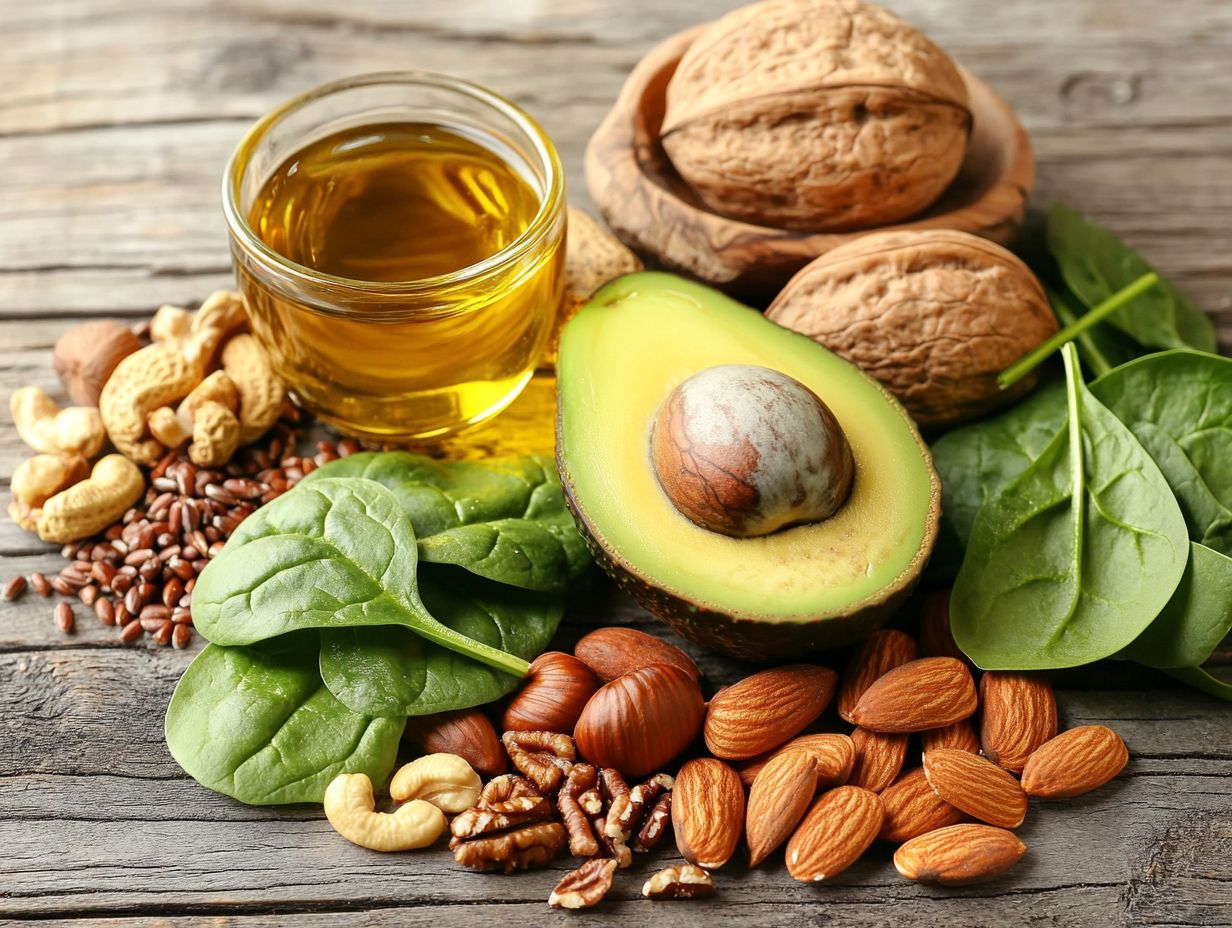
Common food sources of vitamin E include sunflower seeds, almonds, hazelnuts, peanut butter, spinach, broccoli, avocados, and vegetable oils like sunflower, safflower, and corn oil. Additionally, it’s important to explore understanding the food sources of vitamin C for a well-rounded diet.
How much vitamin E should I consume in a day?
The recommended daily allowance (RDA) for vitamin E is 15mg for adults. However, the specific intake may vary based on age, gender, and overall health. It’s best to consult a healthcare professional for personalized recommendations.
Can I take vitamin E supplements instead of getting it from food sources?
While supplements can provide a quick source of vitamin E, it’s always best to obtain it from whole food sources. Whole foods contain other essential nutrients and antioxidants that work together with vitamin E for maximum benefits. However, if you have a deficiency, a doctor may recommend supplements.
Are there any health risks associated with consuming too much vitamin E?
Vitamin E is generally considered safe in moderate amounts, but high doses through supplements can increase the risk of bleeding and may interact with certain medications. Stick to the recommended daily allowance and consult a healthcare professional before taking supplements.
What are the signs of a vitamin E deficiency?
A vitamin E deficiency is rare but can manifest as muscle weakness, vision problems, and impaired immune function. People with conditions that affect fat absorption, such as Crohn’s disease, are more at risk for deficiency. If you suspect a deficiency, consult a doctor for proper diagnosis and treatment.
For any health concerns or specific needs, please consult a healthcare professional.

